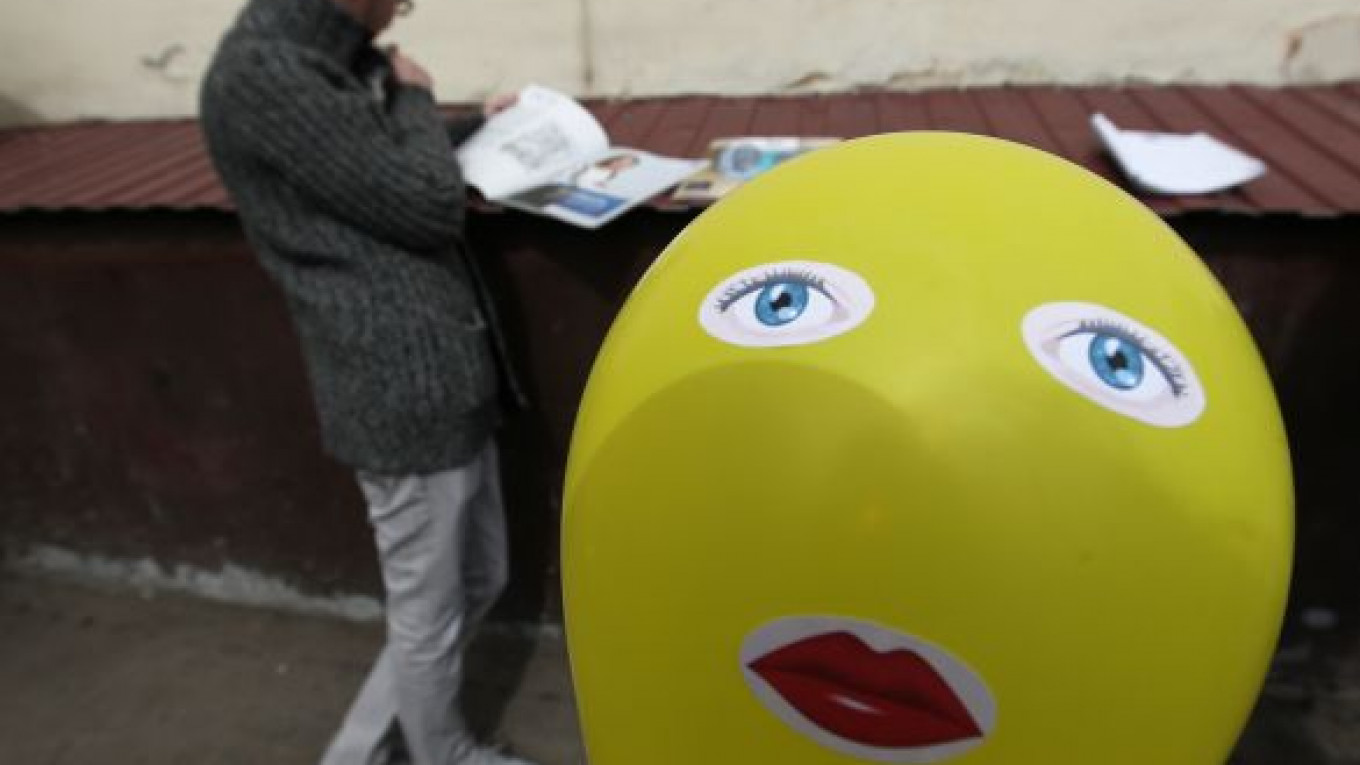Pussy Riot band members, on the first day of their trial Monday, apologized to Russian Orthodox believers for performing an anti-Putin song in a Moscow cathedral in February, but several prominent church members refused to extend forgiveness, and Prime Minister Dmitry Medvedev called for "calm."
The three defendants — Nadezhda Tolokonnikova, 22; Maria Alyokhina, 24; and Yekaterina Samutsevich, 29 — presented written apologies to believers for their performance at Christ the Savior Cathedral, at which four masked women dressed in colorful clothes climbed onto the solea, which is off-limits to the public, and sang a song that contained obsсenities and denounced President Vladimir Putin.
The women said the venue for their impromptu performance might have been inappropriate, but they insisted that they had never been motivated by religious hatred, only a desire to persuade church leaders not to meddle in politics.
"If our passion looked offensive, we sincerely regret that," Tolokonnikova said in a statement read by the band's lawyer, Violetta Volkova, in Moscow's Khamovnichesky District Court.
Tolokonnikova called the band's performance an "ethical mistake," while another band member, Alyokhina, asked prosecutors to treat the infraction as a misdemeanor rather than a felony.
The trio pleaded not guilty to felony charges of hooliganism motivated by religious hatred.
Hooliganism by itself is a misdemeanor that carries a 15-day jail sentence or a fine of up to 2,500 rubles ($80).
The defendants have been jailed since March.
Valentin Lebedev, head of the Union of Orthodox Citizens, a group of church laity, dismissed the apologies as "a sophisticated form of hypocrisy," Interfax reported.
Lebedev said the band should have apologized to Patriarch Kirill and Putin.
Kirill Frolov, head of the Association of Orthodox Experts, an influential group of religious scholars, called the apologies "a typical attempt to avoid responsibility," according to Interfax.
Moscow Patriarchate spokesman Vsevolod Chaplin has said the Russian Orthodox Church would not forgive the band members unless they "repented."
The patriarchate did not immediately comment on the band's apologies Monday.
Judge Marina Syrova on Monday banned photo and video cameras in the courtroom during witness testimony and the presentation of evidence, siding with prosecutors, who had argued that the ruling was needed for the safety of trial participants.
Syrova also struck down defense lawyers' requests to question Patriarch Kirill at the trial and to be granted more time to study the case materials.
Evidence presented at the trial might clear up what exactly happened at Christ the Savior Cathedral on Feb. 21.
Several bloggers and reporters recorded the performance after being invited by the band to witness it.
But the only video that has surfaced on the Internet was shot from a considerable distance away. The volume is low, and the words of the band are indistinct.
Orthodox believers were angered by another video, a compilation of the performance at Christ the Savior Cathedral and a similar performance staged two days earlier at Moscow's Yelokhovsky Cathedral that was louder and accompanied by the sound of rock music.
Medvedev, meanwhile, urged people to treat the trial calmly because no verdict has been reached.
According to a transcript of an interview with Britain's Times newspaper Monday on the Russian government's website, Medvedev said the band members would have faced "a more severe punishment … in some countries" than they might in Russia.
Medvedev conceded that pretrial detention was a "serious ordeal" for the defendants and their families. But, he said, opinions will always be different about what is permissible "from a moral point of view" and which "ethical actions transform into criminally prosecuted behavior."
Volkova dismissed Medvedev's comments, saying the prime minister wanted people to "treat legal nihilism and a lack of justice calmly."
Another defense lawyer, Nikolai Polozov, expressed concern that Medvedev's declaration that Pussy Riot would have faced harsher punishment in other countries was meant to pressure the judge to hand down the maximum seven-year sentence.
It was not immediately clear when the next court hearing would take place and when the verdict might be delivered. Repeated calls to the band's three lawyers went unanswered, and a court spokeswoman, reached late Monday, said the judge had yet to wrap up the first day of the trial.
Also Monday, Pussy Riot found new support both at home and abroad.
State Duma Deputy Sergei Mironov, who leads the Just Russia party, on Twitter that he had never approved of the performance but that he "strongly opposed" the defendants' detention, both now and after the trial.
Boris Nemtsov, co-leader of the opposition group Solidarity, said outside the court that the band "presented no threat to anyone, and therefore their detention makes them political prisoners," Interfax reported.
British rocker Peter Gabriel joined a lineup of international stars in voicing support for Pussy Riot.
"You have the right to make your own prayers — from the heart," Gabriel wrote in a note that he passed to the band through music producer Alexander Cheparukhin, who posted it on Facebook.
A Message from The Moscow Times:
Dear readers,
We are facing unprecedented challenges. Russia's Prosecutor General's Office has designated The Moscow Times as an "undesirable" organization, criminalizing our work and putting our staff at risk of prosecution. This follows our earlier unjust labeling as a "foreign agent."
These actions are direct attempts to silence independent journalism in Russia. The authorities claim our work "discredits the decisions of the Russian leadership." We see things differently: we strive to provide accurate, unbiased reporting on Russia.
We, the journalists of The Moscow Times, refuse to be silenced. But to continue our work, we need your help.
Your support, no matter how small, makes a world of difference. If you can, please support us monthly starting from just $2. It's quick to set up, and every contribution makes a significant impact.
By supporting The Moscow Times, you're defending open, independent journalism in the face of repression. Thank you for standing with us.
Remind me later.






